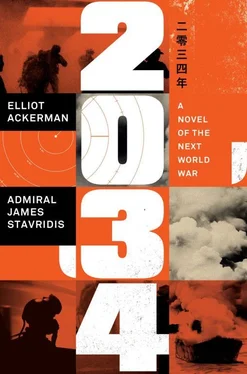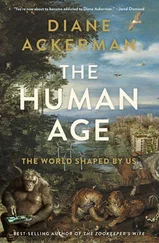He watched the timer. He wondered again if perhaps he’d teach when this war was over. The idea of returning to the academy, or to any of his country’s war colleges, was unappealing. Their curricula were merely programs of regurgitation. The professors had no input in their development. To teach the way he wanted to, he’d need to settle in the West. However, with each passing day of the current conflict that seemed more and more like an impossibility. And if he couldn’t teach, he would at least use his retirement to refocus on his family, to reestablish his relationship with his daughter, which had lost the warmth it had known during their days in Newport almost a decade before. No one could take his family from him, he thought, as the timer on the microwave went off.
Lin Bao took his meal in its plastic container and settled down on the sofa in the living room. He uncapped a bottle of Tsingtao and took a long pull. With one hand he grasped his beer by the neck and with the other he held his remote as he scrolled through a series of unfamiliar television shows. How long had it been since he’d had a night alone like this? Feeling overwhelmed by his program choices and disoriented by being on his own, he struggled to relax. He couldn’t quite bring himself to take advantage of his time off. Eventually, he rerouted his internet through an illicit VPN he’d downloaded, allowing him to watch an uncensored broadcast of BBC News from London.
The pasty-faced anchor led with a story, “…coming from the open waters south of Japan in the Philippine Sea…” According to reports, freighters transiting into and out of the Pacific had observed a massive fire. Ceaseless clouds of smoke billowed miles into the air. Early speculation leaned toward this being the result of an undersea drilling disaster; however, the BBC and other networks soon dispelled this theory. No energy companies had wells in that remote portion of the Philippine Sea. An intrepid private pilot had, with that afternoon’s sun descending off her left tail wing, managed to fly the approximately two hundred miles southeast from the Japanese archipelago of Naha. The BBC was livestreaming video recorded by the pilot, while the anchor, mumbling away, attempted to make sense of the images.
Lin Bao set his beer on the floor and put his meal on a side table. He craned his neck forward, his face pressing closer to the television.
It couldn’t be.
He would’ve heard.
There would have been a cry for help.
But then Lin Bao thought of them heading west, their stealth technology fully engaged while maintaining the discipline of a communications blackout. A student of history, he recalled the USS Indianapolis , which had gone down in the Philippine Sea almost a hundred years before, sunk by a torpedo fired from a Japanese submarine; it’d taken four days for the Americans to realize what had happened.
Lin Bao continued to watch closely, his eyes unblinking.
The pilot, who was narrating parts of the livestream, explained that she had to keep her distance. Secondary explosions made it difficult for her to approach any closer. Her plane rattled in the turbulent air. Then, through a break in the smoke, Lin Bao saw it. The familiar slope of its prow, the gentle arch where its anchor lay: his old ship, the Zheng He .
She was ablaze, listing hard to starboard.
The news anchor still didn’t understand what he was looking at. He fumbled along through his broadcast, hypothesizing along with his coanchor as to what all this smoke and fire at sea could possibly mean. Lin Bao, however, was already up from his seat, out the door, and on his way back into the ministry. He forgot to switch off the television.
An hour later, when his daughter returned his call, he wasn’t available to take it.

12:25 July 29, 2034 (GMT+5:30)
New Delhi
This was Chowdhury’s second trip to the Defense Ministry in as many weeks. His first trip had proven eventful by way of introductions. Over lunch, Chowdhury had met the defense minister himself, the chief of staff of the armed forces, and an extensive retinue of staff officers. Sitting around an oval table in the minister’s personal dining room, each of them had offered their condolences for “the atrocities at Galveston and San Diego.” None of them knew about Chowdhury’s ex-wife, or his recently motherless daughter, so these condolences felt impersonal, like one nation’s theoretical expression of sympathy for another. No one had said anything of substance in that first meeting; it had served to open a dialogue.
Now Patel had recalled his nephew to the ministry for a second time. They met down by security. Despite Patel’s retired status he had a badge that listed him as permanent staff, allowing him to come and go as he pleased. When Patel arrived, he cut to the front of the security line and was promptly handed a visitor’s badge for his nephew. The two were waved through a turnstile by an alert, white-gloved soldier in his service dress.
Patel walked briskly, with Chowdhury trailing a half step behind. Unlike the day before, when they’d followed the long corridor toward the upper-floor offices of the senior ministry officials, Patel led Chowdhury down to the basement. With its low ceilings and flickering halogen bulbs, this was the domain of minor officialdom. Eventually, they found themselves at a small canteen. “Let me buy you a cup of tea,” said his uncle.
Chowdhury followed him inside. There were only three tables, each empty. Patel explained that the woman at the cash register was the pensioned widow of a long-since-martyred soldier. Patel paid, dropped a few extra coins in her tip jar, and offered the elderly widow his most convivial smile.
“I was hoping we could talk unofficially,” Patel began as they sat. “When I brought you here last week to meet the defense minister and chief of staff, it was to convey to you that I speak for the senior-most levels of our government. Understood?”
Chowdhury nodded. He didn’t quite understand why he’d been chosen as the receptacle for whatever message his uncle seemed poised to deliver. Why wasn’t this proceeding through official channels, through the ambassador, or even some lesser embassy official? As if in anticipation of these concerns, his uncle explained, “Within your government, certain parties have a strong interest toward escalation. They will knowingly misinterpret our actions. Because of this, it is important for you to convey clearly both what we have done but also what we are willing to do.”
Chowdhury studied his uncle. “By ‘certain parties,’ who do you mean?”
“I believe you know who I mean,” answered Patel.
“Wisecarver?” asked Chowdhury quietly.
Patel neither affirmed nor refuted Chowdhury’s guess. He took another sip of his tea before explaining, “Our government, specifically the leadership in this building, is not choosing a side. We are not supporting Beijing. And we are not supporting Washington. We are allied with no one. Our support is for de-escalation. Do you understand?”
Chowdhury nodded.
“Good,” added Patel. “Because what I’m about to show you might be confusing to your national security staff.” From his pocket, Patel removed his government-issued cell phone. He began to scroll through a series of photographs taken along the surface of the ocean, with waves cresting in the bottom of the frame. Superimposed over each image was a reticle, as if from a gunsight, with crosshatched X and Y axes bisecting its width and length. As Patel scrolled through each picture the ship on the horizon drew closer, until Chowdhury could clearly observe an aircraft carrier. Patel paused for a moment, glanced once more at his nephew, and then cycled to the next photo….
Читать дальше













